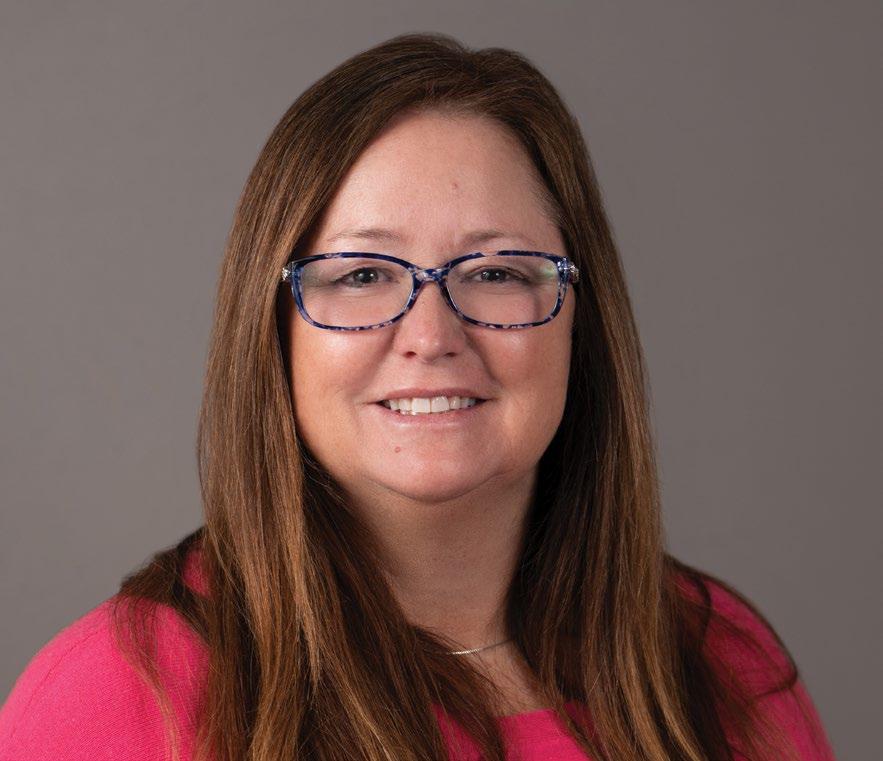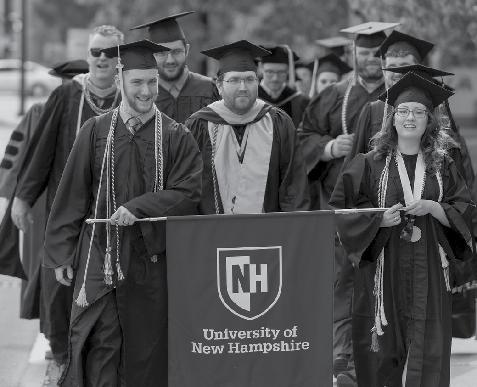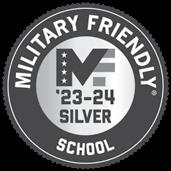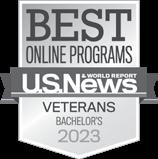College of Professional Studies





When we look back on our lives, there are small moments that ultimately impact our future. For Tamara Foye, watching the late '80s sitcom A Different World was revelatory. The show featured students at Hillman College, a fictional HBCU campus that showcased, in an unprecedented way, diverse young adults who lived in a college community coming of age, learning about themselves, and often tackling important social issues. It made an impression.
“It was just a television show, but it was the first time I can remember thinking that college was a diverse place where smart and independent young people come together to learn, grow, and challenge one another.”
Tamara realizes that the show kindled an excitement about the idea of college and contributed to her motivation to attend. While Tamara was the first in her immediate family to graduate from college, her parents were highly supportive of Tamara and her sister pursuing higher education. She describes that they would talk about “when” not “if” college would happen. Tamara enjoyed a traditional college experience at Rider University where she, interestingly, majored in Mass Communications, Radio, and Television.
Almost twenty years after her first college experience, Tamara found herself living and working in New York City with her husband, Shaimond, and sons Shaimond Jr. (20), Jai (11), and daughter, Ariana (15). In addition to working full time in the city and raising her family, Tamara’s faith and church community became very important to her. She and her friends would talk about the challenges of parenthood, especially for women who are often expected to take on multiple responsibilities.
“Connections in our community are crucial for well-being. They provide us with a sense of belonging and purpose and opportunities for support.”
Inspired by her own support system, Tamara imagined starting a nonprofit, Moms L.O.V.E., focused on building a community for mothers. As she developed a plan to secure the resources to start and operate a nonprofit, she needed to ensure that it was set up correctly and in compliance with applicable laws. Perhaps it was this experience of founding her own organization that made her a particularly well-qualified candidate for a position within the NYC Department of Small Business Services (SBS). SBS helps connect New Yorkers with resources to create strong businesses.
For perspective, the City of New York is the largest local government in the U.S., with nearly 400,000 employees and 80 agencies. Like many municipalities, NYC government is filled with opportunities for talented individuals. One key
to recruiting and retaining talent is offering professional development classes and degree programs that can help employees hone their skills and advance their careers.
Through the Mayor’s Graduate Scholarship Program, full-time New York City government employees with undergraduate degrees are encouraged to pursue advanced degrees. Tamara learned about the opportunity and the City’s partnership with UNH College of Professional Studies (formerly Granite State College).
"I really hadn’t considered going back to school until I started examining the

job market. A minimum requirement for most companies was a bachelor’s degree. However, candidates with master’s degrees were preferred for more senior-level positions. I knew that I wanted to pursue more opportunities, and whether I started my own company or worked for one, I wanted to obtain a master’s degree and the knowledge that comes with it."
Long before Tamara knew the tenets of project management, she was a planner. It is how she achieved so much in her busy life. While she had originally imagined pursuing a master’s degree in business, she came to realize that a project management mindset had helped her operate with direction and purpose.
"I prioritize, make lists of the most important tasks, and focus on completing the most critical. By creating a schedule that outlines work, school, and personal obligations, I’m able to use time wisely by taking advantage of downtime to complete small tasks or assignments. The more I thought about it, studying project management made sense."
"My next step was to choose a university with a good program and reputation that would understand my need to balance college with my life."
In December 2022, Tamara achieved a graduate certificate in project management, the first milestone toward her ambitious goal of completing her M.S. Project Management degree at UNH this fall.
Tamara points to a particular Lean Thinking course that taught her techniques for eliminating wasteful tasks, defining goals, and documenting deliverables and tasks from beginning to end. She thinks about adding value constantly.
“Even with a personal event like planning a birthday, I think about what the experience will be and how I want people feel when they leave at the end. I identify milestones to know I’m on track. When I work with my nonprofit, these practices keep the work in scope and on track."
As a person of faith, Tamara believes that going back to school has helped her to become a better project manager and will ultimately allow her to be of service in an even greater capacity.

"I have a purpose and my purpose is not solely for myself but to give back and use my life and experience, talent, and abilities to make others’ lives better. It’s important to me that Moms L.O.V.E. thrives. The safe, resource-rich community our board of directors and volunteers are creating is meaningful to those we serve.”
Tamara describes that for all its benefits, her college experience this time is “night and day” from her undergraduate experience. Back then, her parents took on the burden of student loans and her primary responsibility was studying and making the most of the opportunities that college presented.
"As an adult, there’s so many things that push against you. There are so many distractions and responsibilities, which is why it is important to seek support. In my case, my husband has been a wonderful partner in helping to step in and keep things moving in our household when I have been unable to. Since 2020, my kids have seen me buckle down and do the work to earn my master's degree. They know that if you want something in life, you have to work for it. At first, I didn’t think of myself as a role model, but I guess for my children, I am their A Different World.
Download Our Business Career Guide cps-info.unh.edu/business-career-guide

Amy Allen is an education administrator with decades of experience and a faculty member for our Special Education Law course. Beginning July 1, she will serve as Superintendent of Schools for the Lebanon School District. Since 2017, she has served as Assistant Superintendent of Elementary and Innovation for the Manchester School District. Previously, Amy also served as the principal of Parker-Varney Elementary School in Manchester. Under her leadership, Parker-Varney won the NH Elementary School of Excellence EDies Award in 2015 and the National School Innovation and Change Award in 2016. During her time at Parker-Varney, Amy focused on project-based learning and personalized learning.

What characteristics make someone a great educator?
A great teacher is flexible, adaptive, and empathetic, but most importantly is able to create an environment that fosters a sense of belonging. Students and educators thrive in these settings.
Many of our adult students pursue teaching as a new career path. How can prior industry experience be a strength?
Prior industry experience is definitely a strength in education. Educators constantly look for pathways to connect academic knowledge to real-world applications. Some of our best science teachers were chemists or computer scientists. Project management, communication, collaboration, creativity, critical thinking, and problem solving skills transfer into the classroom.
As a faculty member teaching the Special Education Law course, why is it important to you to provide special education legal background for future teachers?
All teachers must hold ethical and legal responsibilities, but special education teachers are experts in the federal laws that govern and support our students with disabilities. We have a responsibility to students and families. Our course focuses on the laws, their implementation, and strategies for building relationships with families.
Why is teaching education at the college level important to you personally?
As a 2004 graduate, I saw firsthand the impact that this program in particular has had on the field and students. The program is designed for the adult learner who is a career changer or someone who is looking for additional certifications or experience. It is student and learner-focused. It models effective pedagogy and authentic learning. Our students apply what they are learning in real-time.
Teaching education at UNH College of Professional Studies is important to me as I am able to stay connected to the field and develop future educators and leaders. Our students impact the lives of so many through their work. It is my responsibility to support them and give them a foundation for their careers. As an Assistant Superintendent, when we see a Granite State College graduate, we know they are prepared to enter the classroom. Our students impact the lives of so many through their work. It is my responsibility to support them and give them a foundation for their careers.




Dear Students,
Welcome to the University of New Hampshire!
When we began the planning to merge Granite State College and University of New Hampshire, our goal was to create purposeful growth of online programs and to better serve students by increasing the breadth of offerings, advancing the educational mission, and strengthening the University System of New Hampshire.
After almost two years of intensive work and collaboration, led by Dean Mike Decelle and the merger steering committee, we have met important milestones toward launching the UNH College of Professional Studies. The integration of our teams and systems now culminates with the opening of registration for the Summer Session. We want to say a special thank you to the many faculty, staff, and alumni that have contributed to the merger implementation teams.
We’re especially thankful to you.
In our town hall meetings and surveys leading to this moment, students collectively shared enthusiastic support. You also shared what matters most and we heard you.
UNH College of Professional Studies students can expect a personalized learning experience and the opportunity for meaningful engagement with scholar-practitioner faculty. You can expect access to nationally recognized online programs. In fact, our programs were recently recognized among the top colleges for online bachelor’s degrees and bachelor’s degrees for military affiliated students. In part, that is due to the dedicated academic advising, expansive career support, and expert student services provided by our professional team. You’ll also join UNH’s expansive community of learners and alumni network.
On behalf of the University, welcome to the UNH College of Professional Studies.
Sincerely,

James W. Dean, Jr.
Focused exclusively on adult students, we have been consistently recognized for our long-term investment in designing and scaling student services, technologies, curricula, and instructor training to support student success. We are top ranked in New Hampshire for "Best Online Bachelor's Programs" and nationally recognized as "Military Friendly®" and among the "Best Online Bachelor's for Veterans" by U.S. News and World Report.
Learn More About All UNH Degree Programs: catalog.unh.edu/programs/
• A.S. Behavioral Science (7 options)
• A.S. Business (10 options)
• A.S. Communication Sciences and Disorders
• A.A. General Studies
• A.S. Early Childhood Education
Bachelor’s
• B.S. Accounting and Finance
• B.S. Applied Psychology* (10 options)
• B.S. Business Management (16 options)
• B.S. Computer Information Technology* (3 options)
• B.S. Criminal Justice
• B.S. Digital Communication Design (2 Options)
• B.S. Health and Wellness
• B.S. Health Care Management
• B.A. Historical Studies*
• B.S. Human Resource Management
• B.S. Human Services (8 Options)
• B.A. Individualized Studies (1 Option)
• B.S. Individualized Studies (6 Options)
• B.S. Marketing
• B.S. Operations, Supply Chain, and Logistics Management
• B.S. Professional Communication (3 Options)
• B.S. Public Administration
• B.S. Technology Management
Bachelor’s
These options require an earned associate degree in a related field, maximizing your transfer credits toward a bachelor’s degree.
• B.S. Allied Health Leadership
• B.S. Applied Studies Education and Training
• B.S. Applied Studies Management
• B.S. Fire Service Administration
• B.S. Nursing (RN to BSN)
Note: Professional licensure, certification, or training may serve as a foundation to these degrees, upon approval by Academic Affairs.
• Accounting
• Addictions Studies
• Adult Learning and Development
• Applied Psychology*
• Business and Strategic Communication
• Computer Information Technology*
• Counseling Foundations
• Court Advocacy
• Criminal Justice
• Data Analytics
• Digital Marketing*
• Early Childhood Education
• Economic Sciences*
• Education Advocacy
• Emergency Management Strategy and Planning*
• Entrepreneurship and Innovation*
• Family Studies
• Finance
• Global Business
• Graphic Design
• Health Care Management
• Historical Studies*
• Hotel, Restaurant, and Travel
• Human Resource Management
• Human Services
• Interpersonal and Organizational Communication
• Leadership, Change, and Social Responsibility*
• Management
• Nonprofit Management
• Operations, Supply Chain, and Logistics Management
• Organization and Business Administration*
• Organizational Psychology
• Professional Sales
• Public Administration and Policy
• Visual Communication and Social Media
• Wellness and Prevention
• M.S. Instruction and Leadership
(Requires Post-Baccalaureate Teacher Certification with a minimum of 24 earned credits)
• M.S. Health Care Management
• M.S. Human Services Administration
• M.S. Leadership
• M.S. Project Management
• M.S. Nursing Health Care Leadership
Nursing Degrees are CCNE Accredited
To read more, visit: chhs.unh.edu/nursing/accreditation
We offer four NH Department of Education-approved bachelor’s degrees with a selection of teacher certification options.
B.S. in English Language Arts* Certification options include:
• Early Childhood Education and Early Childhood Special Education
• Elementary Education and General Special Education
• General Special Education
B.S. in Math Studies* Certification options include:
• Elementary Education and General Special Education
• General Special Education
• Mathematics, Middle Level
• Mathematics, Middle Level and General Special Education
• Mathematics, Upper Level
B.S. in Social Studies* Certification options include:
• Elementary Education and General Special Education
• General Special Education
B.S. in Early Childhood Education Certification options include:
• Early Childhood Education and Early Childhood Special Education
*New program name for Fall Term
These programs allow you to specialize your knowledge through a shorter, focused sequence of courses. The credits earned in our certificate programs can also be applied toward its corresponding master’s programs, allowing you to earn a certificate on the way to a degree.
• Health Care Management
• Human Services Administration
• Nonprofit Leadership
• Operations Management
• Project Management
For those with a bachelor’s degree seeking initial or an additional certification.
• General Special Education
• General Special Education and Elementary Education
• Early Childhood Special Education and Early Childhood Education
• Life Sciences, Upper Level
• Mathematics, Middle Level
• Mathematics, Upper Level
Additional Certifications
• Elementary Education
• General Special Education
• Early Childhood Special Education and Early Childhood Education
• Life Sciences, Upper Level
• Mathematics, Middle Level
• Mathematics, Upper Level
• Reading and Writing Teacher**
• Reading and Writing Specialist**
• Digital Learning Specialist
Advanced Endorsements:
For certified special education teachers.
• Specific Learning Disabilities (SLD)
• Intellectual and Developmental Disabilities (IDD)
• Emotional and Behavioral Disabilities (EBD)
**Two years of classroom teaching experience required. Reading and Writing Specialist also requires a master’s degree for certification.
The anticipation of starting or returning to college is exciting! Of course, it also comes with many questions. Whether you seek career guidance, registration support, financial aid, or academic advising, our team will be available by chat, phone, via Zoom, or email.
Chat Live | Submit a Question cps.unh.edu/online
Our academic calendar contains important dates related to course registration, financial aid, tuition payment, as well as various academic or college-wide deadlines.
• May 16
Registration begins—Register online or by phone
• June 2
Preferred Financial Aid submission date
• June 9
SAP appeal deadline for term reentry (due by Noon ET)
• June 14
Tuition and fees payments due no later than 5:00 p.m. (ET) for all courses beginning the week of June 26. This includes payment arrangements, such as financial aid. Immediate payment is required in order to register for courses after this deadline.
• June 19
Closed in observation of Juneteenth holiday
• June 26-30
First week of Summer Term
• June 30
Last day to add 8-week courses
• July 4
Closed for Independence Day Holiday
• July 7
Last day to drop 8-week courses
• July 27
Last day to withdraw from 8-week courses
• August 14-18
Last week of Summer Term courses

We are dedicated to supporting you as you complete your program. Our knowledgeable and caring advisors assist students as they transition to our learning environment. They also help students identify goals and develop strategies to achieve them.
an
Call: 1-855-472-4255 or Chat Live at: cps.unh.edu/online
The details included in the printed and digital version of this course schedule are helpful for planning and accurate as of the date of publishing. For the most up-to-date course information, visit our Course Search Database. Search for a UNH CPS course by selecting the CPS Online "campus" and entering Course Subject & Number (Ex: MGMT 611) or Title (Ex: Money and Banking). Visit: courses.unh.edu
College Catalog
The College Catalog contains helpful information such as course descriptions, prerequisites, restrictions, and policy information.
For summer, utilize the 2022-2023 Catalog: catalog.granite.edu Access the 2023-2024 catalog in August: catalog.unh.edu
Along with the fresh design of our brand to align with University of New Hampshire, soon we'll transition to new social channels! For now, stay connected with our online student community through our current social media channels and blog.
Social Media
Facebook: @granitestatecollege Instagram: @unhonline
On the Web
Visit: cps.unh.edu/online
Current Student Resources: cps.unh.edu/current-students
Student Success Blog
Visit: cps.unh.edu/blog

Whether you’re starting college for the first time, or returning to finish your degree, attending an orientation gives you a valuable introduction to the College that will help you feel prepared as a student.
There are two types of essential orientations:
• New Student Orientation
Overview of the resources and support available to you as a student, plus success tips for your first term.
• Canvas Orientation
Learn how to navigate and participate in your online courses in Canvas, the College’s learning management system.
Orientations are available on-demand and via live webinars.
View Details & Dates: cps.unh.edu/orientation
The following listing displays in-state tuition cost. A full breakdown of tuition and fees is available on page 12. Courses each term are subject to change from the time of printed publication. For the most up-to-date course information, visit: courses.unh.edu
Maximize previously earned credits from your associate degree and progress towards your bachelor’s degree efficiently, saving time and money.
Get Started! cps-info.unh.edu/finish




The following listing displays in-state tuition cost. A full breakdown of tuition and fees is available on page 12. Courses each term are subject to change from the time of printed publication. For the most up-to-date course information, visit: courses.unh.edu

We are pleased to be recognized among the top Military Friendly® colleges and Best Online Bachelor's Programs for Veterans in the nation.
This designation reflects our campus culture that respects all adult learners and honors the heroic commitment of servicemembers, veterans, and military spouses.
Download Our Military Checklist! cps-info.unh.edu/military-checklist


The following listing displays in-state tuition cost. A full breakdown of tuition and fees is available on page 12. Courses each term are subject to change from the time of printed publication. For the most up-to-date course information, visit: courses.unh.edu
The following courses are open to students admitted to the Post-Baccalaureate Teacher Certification Program or by permission of the School of Education. Additionally, these courses are open to other qualified individuals who wish to take one or more courses on a continuing professional development basis. For more information, contact the School of Education at 603-822-5431.

Apply to receive tuition assistance through the Early Childhood Tuition Assistance Grant, funded by the NH Bureau of Child Development and Head Start Collaboration.
• NEW! Now Available to All NH Childcare Workers
This grant is available to all individuals working in a NH licensed childcare or out-of-school time childcare facility.
• NEW! 100% Coverage of ECE Tuition
Applications will be reviewed as received. Applications fill fast, so apply early. For 2023, 100% of tuition is covered for ECE classes. Students are responsible for all materials needed for the course and the $92 academic services and registration fee.
• Applicable up to two courses per term Learn
1. Review your degree planning tools through DegreeWorks to determine unmet requirements. Access your degree audit through WebCat.
2. For each course you wish to take, check prerequisites to ensure you have completed all of them. Please note that some undergraduate courses require a pre-registration skills assessment.
3. Contact your academic advisor with any questions.
To Register for Courses, Visit Us Online or Call: cps.unh.edu/register | 1-855-472-4255
UNH reserves the right to cancel, postpone, or combine class sections, limit registrations, or change instructors. We regret any errors in printing, but we accept no liability for them. Please refer to WebCat for the most updated course schedule.
Students may register for 8-week courses during the official Add Period, which is one week after the course start date.
Students may drop courses during the official Drop Period, which is two weeks after the course start date.
Contact your advisor or the Registrar’s Office for assistance. For courses that do not follow the 8-week schedule, Add Period and Drop Period dates are posted on cps.unh.edu/add-drop
p.m. ET)
If a third party (such as an employer or outside agency) has agreed to pay all or part of your course charges, you must provide a written billing authorization to the Student Accounts Office. The billing authorization must be on official letterhead and include the billable amount. No extensions or deferments will be granted if you will be reimbursed for courses after the completion of a term. Payment must be made directly to UNH upon receipt of an invoice. Payment not contingent upon grade. Cash will not be accepted.
Contact the Student Accounts: 603-513-1330 | 855-472-4255 option #4 studentaccounts.cps@unh.edu
When enrollment is available, Payment Plan links will appear on the Account View page in Webcat. The payment plan carries an enrollment fee of $60 for each semester you enroll in the plan.
1-855-472-4255 | cps.unh.edu/online
3/7/23)
Course charges, fees, and regulations are subject to approval by the University System Board of Trustees and can change without prior notice. For updates, check: cps.unh.edu/tuition
Undergraduate and Post-Baccalaureate Costs:
• $314 per credit hour in-state ($379 out-of-state)
• $628 per two-credit course
• $942 per three-credit course
• $1,256 per four-credit course
• $314 per credit hour for learning agreements
Graduate Costs:
• $558 per credit hour in-state ($609 out-of-state)
• $1,674 per three credit course
Fees:
• Registration Fee: $46
• Academic Services Fee: $46
• Field-Based Mentoring Fee: $275 *
• Prior Learning Assessment Fee: $350
Some courses have materials or other fees (see individual course listings).
*Field-based courses that require the oversight of a Field-Based Mentor will have an additional fee assessed.
Students are responsible for purchasing textbooks and materials. Textbooks are an additional expense. Find detailed information about required books, including ISBN, online. Visit: unh.bncollege.com
Federal, State, and/or Institutional Financial Aid is available to all qualifying degree seeking students, as well as eligible postbaccalaureate and graduate students, to assist with the cost of their education. Students must complete the Free Application for Federal Student Aid (FAFSA), be admitted to an eligible program, and be attending at least half-time (undergraduate and post-baccalaureate students: 6 credits/term; graduate students: 5 credits/term) in order to receive aid.
Contact the Office of Financial Aid at: 603-513-1392 | 855-472-4255 option #3 financialaid.cps@unh.edu
Learn More, Visit: cps.unh.edu/tuition-aid
Below you’ll find what’s new during Summer Session. For regular updates, visit: cps.unh.edu/merger-faqs

• In early May, we'll proudly reveal an enhanced website experience, cps.unh.edu, which achieves a more integrated experience for UNH College of Professional Studies. For current students, your bookmarks should redirect to the new location, if you clear your cache. We encourage you to update with the cps.unh.edu address.
TIP: With the new navigation and menus, use the search tool to find information by keyward.
• Our social channels, including Facebook, LinkedIn, Instagram and YouTube will update by July 1.
• The domain name (@granite.edu or @go.granite.edu) for student, faculty, and staff email addresses will become @unh.edu. No worries if you forget. All "granite" domains will redirect to "unh" during the transition.
• You’ll register online and check your student account and financial aid status using WebCAT.
• For Summer, you’ll register using current course numbers and names, with the addition of a “G”. For example, in the past you could register for CRIT 501. In the summer, you would register for CRIT 501G. As always, your advisor is there to support you every step of the way!
• Your courses will still be in Canvas. We’ll use UNH’s version starting with Summer Session: mycourses.unh.edu
• Most courses will be offered in the 8-week format. Your capstone may be an exception. Check with your advisor.
• You’ll have access to even more expert Career Services and Library Resources.
• When applying for financial aid, use UNH’s school code 002589 on FAFSA.
• Students will need to take two courses at a time (at least six credits for undergraduate and PBTC students and at least five credits for graduate students) to be eligible for financial aid in Summer Session, as there is only one 8-week term offered in the summer.
• This is effective beginning with Summer Session 2023. For more detail, visit cps.unh.edu/tuition-aid or contact Financial Aid at: financialaid.cps@unh.edu
• Our tuition pricing and fees are staying affordable. See page 12 for more on tution and fees.

Classrooms inclusive of all students promote individuality and greater social connections, while also providing new learning opportunities. Studies show that inclusive classrooms improve academic performance and social development across the board. Researchers point to better social competencies and communication skills, fewer school absences and incidents of disruptive behavior, and increased empathy and compassion towards peers.
Developing more inclusive classrooms and meeting the needs of students with disabilities nationwide requires the expertise of special education teachers, who provide academic assistance and facilitate social support systems.
SOURCES:
National Center for Educational Statistics. Fast Facts: Inclusion of Students with Disabilities. (Visited February 2023).
Center for Disease Control and Prevention. Developmental Disabilities, CDC’s Work on Developmental Disabilities. (Visited February 2023).
Understood. Four Benefits of Inclusive Classrooms. (Visited March 2023)
1:6
Within the United States, one in six children ages three to 17 have a disability.
60% More Than
More than 60 percent of those students with disabilities spend at least 80 percent of their school day in general education classrooms, according to the US National Center for Education Statistics.
Special education teachers work with students who have documented learning, mental, emotional, or physical disabilities. Individuals in these roles are characterized as patient, adaptable, creative, intuitive, nurturing, and organized. They not only provide academic assistance, but also support and mentor their students and facilitate environments where students feel empowered, seen, accepted, and supported.
Today, the role of a special education teacher goes beyond providing support in the classroom. Teachers now stand as influential advocates for students with disabilities. By gaining familiarity with special education legislation, they often provide guidance to families with children who have disabilities to help them understand and navigate the educational system. Often, to address particular challenges with students, special education teachers conduct research into best practices and tactics to support learning and development of their students.
Even if you don’t plan to specialize in the subject, a certificate in special education can improve and develop your skillset as an educator and prepare you to handle a diverse range of classroom situations. You’ll learn how to better identify the unique learning challenges of individual students and provide innovative learning opportunities to meet the needs of a class.
• All children have equal access to education.
• Education focused on children’s abilities, not disabilities.
• Children learn to be accepting of and compassionate towards one another’s unique abilities, personalities, and challenges.
• Children develop strong friendships with their peers through shared classroom and extracurricular experiences.
• Students develop confidence in their interactions with peers and their academic skills.
• Students receive additional support from specialists when needed.
• A wide variety of assistive technological and educational resources are made available for all students.
• Teachers develop the ability to identify individual students’ strengths and challenges and adapt curriculum and instruction methods appropriately.
SOURCES:
Reading Rockets. Inclusive Classrooms: A Primer for Teachers. (Visited March 2023).
Eredics, Nicole. Reading Rockets. 10 Reasons for Inclusive Schools, 2019. (Visited March 2023.
Nationwide, demand for special education teachers is expected to grow by four percent by 2031. This growth will continue as developmental disabilities become more easily identified and more students enroll in special education programs.
There is consistent high demand for special education teachers, with about 500,000 open positions nationwide in 2021. New Hampshire is among the top five states in the nation with high demand for special education teachers and has one of the highest concentrations of available jobs.
SOURCES:
U.S. Bureau of Labor Statistics. Occupational Outlook Handbook: Special Education Teachers, 2021. (Visited February 2023).
U.S. Bureau of Labor Statistics. Occupational Employment and Wage Statistics: Special Education Teachers, May 2021. (Visited February 2023).
Earning a special education certification allows classroom teachers to gain better understanding of the challenges their students with special needs face each day. Becoming familiar with different special education strategies and approaches to learning can help you set up every student for success."
Holly Bross Field Placement Faculty

To become a special education teacher, you’ll need a bachelor’s degree and a state-issued certification.
Bachelor’s Degrees Leading to NH Certification
• B.S. in Early Childhood Education
• B.S. in English Language Arts
• B.S. in Math Studies
• B.S. in Social Studies
Initial Post-Baccalaureate Teacher Certifications:
• General Special Education
• General Special Education and Elementary Education
• Early Childhood Special Education and Early Childhood Education
Additional Certifications (For Already Certified Teachers)
• General Special Education
• Early Childhood Special Education and Early Childhood Education
Advanced Endorsements (For Special Education Teachers)
• Specific Learning Disabilities (SLD)
• Intellectual and Developmental Disabilities (IDD)
• Emotional and Behavioral Disabilities (EBD)
Become a Special Education Teacher: Earn Your Degree or Certification cps-info.unh.edu/teach












Delivering an educational experience designed for you.












At the UNH College of Professional Studies, we celebrate your journey to college. We respect your busy life and we’re honored to serve students who balance their education with family, career, service, and community responsibilities.

















As the top-ranked provider of online bachelor's degree programs in New Hampshire, we’ll deliver a personalized online learning experience designed to help you achieve your unique goals.
















Get Started Today! cps.unh.edu